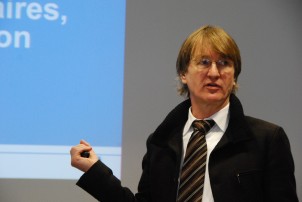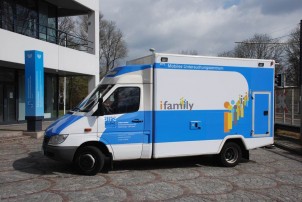I.Family partners lead debates at international conference on nutrition behaviour & physical activity
Results from the IDEFICS Study – precursor to the I.Family Study – will be presented by I.Family partners for the first time this week at the annual gathering of the International Society of Behavioural Nutrition & Physical Activity (ISBNPA).
Professor Wolfgang Ahrens, Co-ordinator of both the IDEFICS and I.Family Studies, has been invited to chair a symposium at this event, which begins today in San Diego, on “Effects of the IDEFICS intervention: a community-based intervention to prevent overweight and obesity in eight European countries.” The symposium takes place on Friday 25th May at 9.15am – the full programme is available here.
The IDEFICS Study ran from 2006-2012 and examined children between the ages of two and nine in eight European countries (Belgium, Cyprus, Estonia, Germany, Hungary, Italy, Spain and Sweden). The I.Family Study is currently building on the work of IDEFICS, monitoring the children as they move into adolescence.
Professor Ahrens explains, “IDEFICS involved a cohort of more than 16,000 children – about 2,000 per country and equally divided over intervention and control areas –examined at baseline and two years later, allowing an evaluation of the effectiveness of the prevention programme.”
ISBNPA is the international leader in advancing and fostering excellence in research on nutrition behaviour and physical activity. With close to 400 members representing 29 countries, ISBNPA is “an excellent opportunity to showcase the work of the IDEFICS and I.Family Studies, and to inform the global debate on childhood health and obesity,” said Professor Ahrens.
In the IDEFICS symposium at ISBNPA, I.Family partners will present on:
- “Effects of the two-years IDEFICS community intervention on body composition and physiological parameters in young children “ (Professor Wolfgang Ahrens, Leibniz Institute for Epidemiology and Prevention Research -BIPS, Germany)
- “Behavioural effects of a community-oriented setting-based intervention for prevention of childhood obesity” (Professor Iris Pigeot, Leibniz Institute for Epidemiology and Prevention Research -BIPS, Germany)
- “Process evaluation of the IDEFICS intervention: putting effect evaluation in context”
(Author: Ilse De Bourdeaudhuij /Presenter: Lea Maes, Ghent University, Belgium)
ENDS/Contacts and Notes follow
Media contacts:
Kate Viggers/Rhonda Smith – Minerva UK – +44(0)1264-326427 – +44(0)7887-714957 – +44 (0)7921-804641
Notes for Editors:
- The IDEFICS (Identification and prevention of dietary- and lifestyle-induced health effects in children and infants) Study was funded by the European Commission with two aims: (1) To investigate the aetiology of diet- and lifestyle-related diseases and disorders with a strong focus on overweight/obesity in children; (2) To develop, implement and evaluate a setting-based community-oriented preventative intervention programme.
- The I.Family Study is an EC funded project under Framework 7 of the KBBE programme running from March 2012 to February 2017. It has 17 partners, working across 11 countries and with cohorts in 8 European countries – Germany, Italy, Sweden, Hungary, Cyprus, Estonia, Spain and Belgium. The Study has two strategic objectives:
(1) Understand the interplay between barriers against and drivers towards healthy food choice; (2) Develop and disseminate strategies to induce changes that promote healthy dietary behaviour in European consumers especially adolescents and their parents - The I.Family Study is re-assessing the families first engaged with the Identification and Prevention of Dietary- and Lifestyle-Induced Health Effects in Children and Infants Study (IDEFICS), when children were below 10 years of age, now that they move into adolescence – the ‘tween’ years – identifying those families that have adopted a healthy approach to food and eating habits and those that have not. I. Family is adopting a holistic approach by also investigating the biological, behavioural, social and environmental factors that drive dietary behaviour as children journey towards adulthood.
- I.Family Study partners:
| Participant organisation | Lead investigator(s) | Key responsibilities |
| University of Bremen, Germany | Wolfgang Ahrens | Project coordinator |
| BIPS – Institute for Epidemiology and Prevention Research GmbH, Germany | Iris Pigeot | German cohort, statistics |
| Institute of Food Sciences, National Research Council, Italy | Alfonso Siani | Italian cohort, nutritional epidemiology |
| Copenhagen Business School, Denmark | Lucia Reisch, Wencke Gwozdz |
Consumer behaviour & environmental influences |
| University of Lancaster, United Kingdom | Garrath Williams | Ethics, policy, and stakeholder engagement |
| Sahlgrenska Academy at the University of Gothenburg, Sweden | Staffan Mårild, Lauren Lissner |
Swedish cohort, family analysis |
| University of Helsinki, Finland | Jaakko Kaprio | Familial aggregation & genetic modelling |
| University of the Baleares Islands, Spain | Andreu Palou, Catalina Picó |
Genomic analysis |
| University of Pécs, Hungary | Dénes Molnár | Hungarian cohort |
| Rudolf Magnus Institute of Neuroscience, The Netherlands | Roger Adan | Neuroimaging & neuropsychology |
| Research and Education Institute of Child Health, Cyprus | Michael Tornaritis | Cypriot cohort |
| National Institute for Health Development, Estonia | Toomas Veidebaum | Estonian cohort |
| Fondazione IRCCS Istituto Nazionale Tumori, Italy | Vittorio Krogh | Dietary assessment methods |
| University of Bristol, United Kingdom | Angie Page, Ashley Cooper |
Physical activity monitoring |
| Minerva PRC Ltd, United Kingdom | Rhonda Smith Kate Viggers |
Dissemination and communication |
| University of Zaragoza, Spain | Luis Moreno | Spanish cohort |
| Ghent University, Belgium | Stefaan De Henauw | Belgian cohort |
Notes/End
140521-IF-PR12-FINAL







